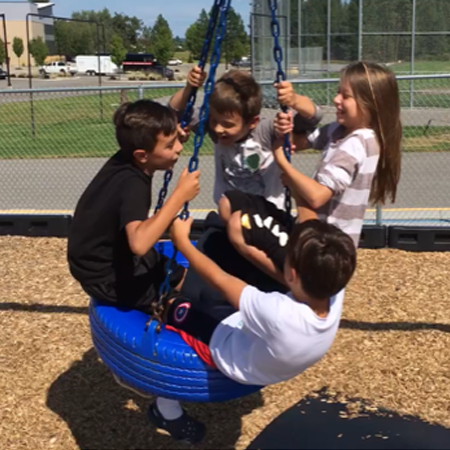Student Perspectives on Remote Education
CategoriesI get tired of having conversations about masks. I got a cool one with the Chicago Cubs emblem that fills me with pride, I wear it everywhere and I feel responsible about it. But the discussion is stale. It's as riveting as a weather review in mid-August or late February. I want to talk about something interesting. My suspicion is that all you teachers are exhausted planning and thinking about online learning, let alone discussing it with EVERYONE. My understanding of the parent perspective is not lacking either. It's a tough scenario. And as I was just realizing this it dawned on me that I haven't heard from students. Is it as much a drag for the kids I know? Are there silver linings, other than the enticement of skipping the tablet conference and building a mud pit in their Dad's prize garden?
With this idea in mind I went shopping for bribes (sugar!) and set them down in front of my niece and nephews with the condition that they answered my questions about their learning experiences last spring and to date early in this first quarter. The insights proved interesting.

Some useful data:
Shiloh - 12 years old, seventh grade
Lorenzo - 10 years old, fifth grade
Tristan - 10 years old, fifth grade
Rosco - 9 years old, fourth grade
What do you think of online learning?
Lorenzo: It's ok, but I wish I could see my friends. I like it because it's not as boring as class, and it's a little easier.
Shiloh: It's better this fall than last spring. There is more teaching and learning this year; it's more structured and organized and I know what I'm supposed to do.
Rosco: I haven't decided.
Tristan: I don't really like it. No friends, no recess and I'm stuck at home.
We discussed recess at this point. In my head recess is about playing, but Tristan pointed out that recess is a time to convene with his favorite confidants and review school and social life. They don't just get their physical energy out but also exercise their social needs. We discussed the possibility of virtual recess for that emotional purpose. I revisited this with Shiloh and apparently she and her best friend keep a separate GoogleDoc open to discuss happenings on the side. Kids are so tech-savvy.
What is the hardest part?
Shiloh: The live classroom setting is much more controllable. Everyone is aware of the issues with focus, but cheating is also common. I don't cheat though.
Tristan: Signing in and keeping track of the schedule. My schedule changes every day and it's written on a piece of paper and sometimes I can't get into the meeting or I forget which meeting I am supposed to join. If I come in a few minutes late I have no way of catching up.
Lorenzo: I get lost sometimes - maybe I lose internet. The teacher has to give us permission to re-enter and I try to catch up but they can't stop and review what I just missed.
What is the best part?
Rosco: I'm not at school (mischievous grin).
Tristan: I have a thirty minute lunch break and I get to watch TV!
Shiloh: I love being in my own room. My room is comfortable and I have all my things and the comfort helps me to focus.
(I thought of this next question because Mr. Pearson, my sophomore chemistry teacher, sat in the same old chair and wrote mundane equations on the same grubby transparency sheet in the same monotonous voice day in and day out for all the years leading to his retirement. He was an exceptionally kind man in a conversation but his colorless teaching style did not incite my love of chemistry. I know this was commonplace in 1996 and for fifty years leading up to it, and after two years of interviews and discussion with modern educators I recognize the style is all but obsolete.)
Do your teachers have methods for making online learning fun and engaging?
Tristan: We have not yet played games but we have discussed ideas and plan to play them soon.
Lorenzo: We have been playing Classcraft. We divide into teams of 4 or 5 for the whole term, some students are healers and some are warriors. We get action points for correct team answers and tally them up to see how our teams and characters progress through the story. It's really fun.
Rosco: My teacher often starts with "Zoom around the room." They say "find something blue" or "find something square" and we get up in our room and find it. This is an active way to get our brains working, and it's fun.
Shiloh: Ms. Provinsal asks a thought generator question to loosen us up and start our brains - like "Everyone tell me your favorite movie."
I looked up Classcraft. I've been pretty curious about gamification for learning. From their home page:
"By enabling educators to use common gaming mechanics in their instruction, Classcraft helps their students see meaning in school and develop the competencies to become better learners. Classcraft's features are all connected to developing different facets of intrinsic motivation and as such, are extremely effective at driving engagement. In fact, one study by UNC Charlotte showed student participation in online classes increasing from 53% to 97%."

Is it getting easier as the quarter progresses?
Rosco: Definitely!!
Tristan: It hasn't changed. It was difficult last year, it's difficult this year and it's not as good as being in school.
Lorenzo: Entering the fourth week it is finally getting easier. I'm starting to flow through it with less problems.
Shiloh: Now that I'm used to the format and schedule it's much easier.
Do you have any advice for teachers?
...crickets...truly...all four.
At this point I mentioned that their teachers would be unlikely to read this article, and they wouldn't be getting into trouble. It's not that I thought they would pour out their unfavorable reviews, but I was surprised at the utter lack of suggestion to this open question. Everyone is trying their hardest, but most of you must believe that you could be more effective in a classroom, and you probably critique yourselves. Does the fact that none of them could formulate an encouraging suggestion or reveal a tip from their own experiences mean that their teachers are nailing it? Does it imply that teachers are (at least by middle schoolers) always received as authoritatively correct in their delivery methods? Or have they never thought of how their learning might benefit from something different than what they have? I haven't found my opinion; it's just really interesting.
How many teachers do you have this term?
Tristan: I have four teachers - music, writing, P.E. and one for all the other subjects.
Lorenzo: Four, one each for music, library and P.E. and one for the basic subjects.
Shiloh: I have a music and a P.E. teacher and then our grade has two teachers working as a team dividing the rest between them. (This is atypical at Shiloh's school but they decided to split up the subjects to be more effective. It has to be easier and more practical.)
How do you do P.E.?

In preparation for this interview I wondered how it could possibly work. I did P90X and online yoga a few times, but two of the most integral concepts instilled in gym class are team play and group effort to achieve a common goal. That's basically impossible online I think. I wondered if you just do jumping jacks and squats on screen.
Rosco: Our PE teacher assigns an activity to do out of class or we do exercise vidoes, usually dancing.
Tristan: She assigns activities to complete off-screen.
Lorenzo: We watch videos and copy the moves, and we do burpees. I like it.
Shiloh: We did some jumping jacks the first week but I haven't had the class this week. I don't know what it'll be like.
I don't want to proclaim that I was right, but it does sound like a curriculum that's really difficult to optimize online. Any P.E. teachers reading that have some great ideas to share (comments at the bottom)?
Which subject is the most difficult to learn online?
Tristan: Social Studies!! It's still boring and it's still hard whether in school or online.
Shiloh: They're all about the same. I'm interested to see about P.E. because we have no equipment to use.
Lorenzo: Following along is difficult with any of the heavier subjects.
Rosco: Math - it's even more boring now...
Do you have an on-screen avatar?
I had seen a few articles about personalizing your online avatar and background. I thought it was a pretty cool idea.
Shiloh: Some of the students have one, but only because they don't have a camera on their computer.
Lorenzo: We can only change the background but no avatar because the teacher has to see us to know we are paying attention to the screen.
Rosco: Mine is my Roblox BokuNo character.

Notable details:
There are four kids in the house (obviously) in four rooms and rule number one is that THE DOORS SHOULD BE CLOSED. They've tried the living room or the dining table with multiple students on multiple machines and it does not work.
Headphones are a MUST. Outside noise is too distracting to hear and stay on task so they all use headphones. Shiloh said the ear pods start to hurt after awhile so she switched to ear cups. Good tip.
Conclusions:
People always say kids are resilient. I'm not there every night asking them how the day went or what they're learning or being completely lost with an assignment because the instruction didn't prepare them for that specific homework lesson; but it sounds to me like they're all adapting. So yeah, they miss their friends, it's still a shock to everyone, and it's not as easy as it once was for all involved. But learning persists. Parents, teachers and kids are all being forced to grasp new skills and adjust to new concepts. And just imagine how grateful everyone will be once things go back to "normal". Instead of "I had to walk to school barefoot uphill in the snow" this generation will tell their grandkids "I had to do school from my room on a tablet."
In the spring excuses, justifiably, abounded. It was triage. Faculty has now had time to prepare, they've had the break to brush up on weaknesses and the parents and kids knew this was coming. Of course I can't speak for everyone but these four kids are doing a good job of it. They aren't running outside to dig a mud pit or drinking two liters of Sprite before class.
There are gaps. Some things must be done in-person for sufficient results. I can learn how to change my spark plugs from a YouTube video but nothing beats hands-on instruction with a seasoned mechanic at my side. The core curriculum and standards of learning can be met, albeit with added struggle. But social and emotional learning will suffer greatly. Detachment might be the greatest concern. How are you going to reach students without adequate support at home, or without connectivity? I've spoken to so many teachers and am always inspired by their caring disposition for each kid and I recognize the inability to reach the ones needing the most help will be brutal. Community will be more important than ever for the next little while. Maybe I'll explore ways to contribute to mine.
Here are a few classes related to this topic:
 Integrating STEAM into your Curriculum
Integrating STEAM into your Curriculum
 Teaching Algebra with Technology
Teaching Algebra with Technology
 21st-Century Learners: Reaching and Teaching the iGeneration
21st-Century Learners: Reaching and Teaching the iGeneration